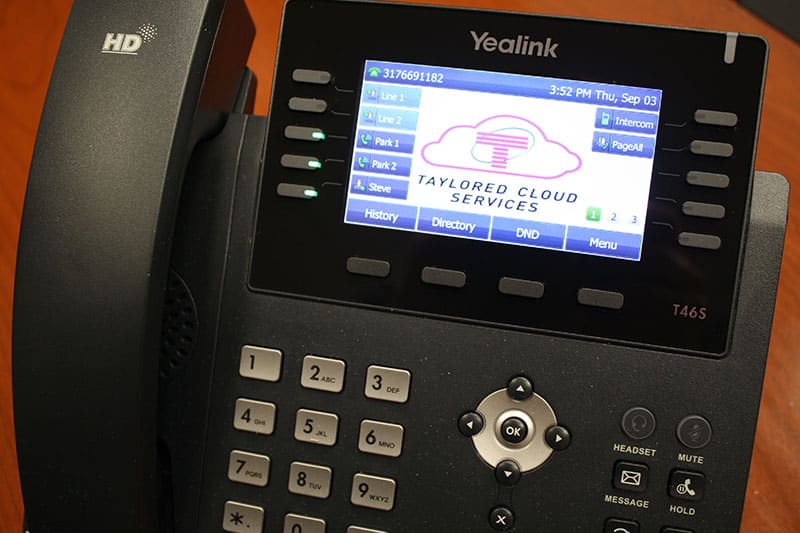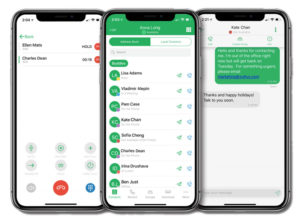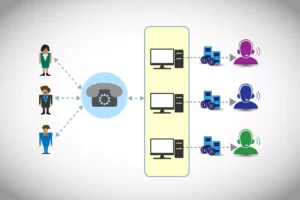
At some point, a small business grows to the point where it can no longer rely solely on its people using personal phones, and phone systems for small businesses do more than simply allow people to make and receive phone calls.
Modern office phone systems have a broad range of functionality and many leverage the latest in technology. This functionality allows small businesses to better serve customers and meet their expectations.
The Two Main Phone Systems for Offices
Individuals considering how to use office phone systems should know there are two main categories: Voice Over Internet Protocol (VoIP) and private branch exchange (PBX).
VoIP phone systems are based in the cloud. Because VoIP connections are entirely digital and wireless-ready, these systems require relatively little hardware investment or installation. These systems are software-based and modifying them does not typically require hardware changes. These systems often come with standalone apps for Android or iOS devices that allow for all kinds of communications functionality.
While they can also be cloud-based, PBX systems tend to have a strong hardware component, and this can require upfront hardware investment and installation. When changes must be made to functionality or users must be added, it typically requires work from a certified technician. PBX systems have been around for decades and updates to PBX technology have allowed these systems to remain relevant.
Both types of small office phone systems help businesses connect with customers and clients. They also enable communication between partners, company leaders, employees and any other members of an organization.
Essential Features of Office Phone Systems for Small Business
Modern company telephone systems provide much of the same functionality as personal phone systems, but they also include many business-focused functions, including mobile phone call forwarding, cloud-based flexibility, encryption, visual voicemail, call recording and texting.
- Mobile app. Many modern office phone systems include a downloadable mobile app that offers a wide range of functionality. In addition to being able to make calls, these apps also offer functions like texting, voicemail, conference calls, contacts, company directory and call logs.
- Cloud-based flexibility. Cloud-based systems also offer significant flexibility, as they allow members of an organization to make calls from anywhere with an internet connection. Set up and administration of these small office phone systems is relatively easy, and cloud-based systems also typically come with their own app.
- Encryption. Companies that discuss sensitive information over the phone, such as financial or healthcare information, may want to consider a higher level of security for their phone system. Enterprise-grade security levels use encryption and other measures to protect all business calls as a default setting.
- Visual voicemail. Checking voicemails in a loud or busy work environment can be difficult. Typically performed with AI-powered software, visual voicemail transcribes voice messages into text, which can then be sent to mobile devices for managers or employees to read at their convenience. Members of an organization can also quickly and discreetly check visual voicemails while in a meeting.
- Call recording. If some of the work a company does involves interviews, making pitches or making deals over the phone, call recording can be an extremely useful tool. Recordings can be referenced later for important details or evidence in the event of legal proceedings. Customer service calls can also be later analyzed for quality control purposes. Some systems also use AI to transcribe call recordings.
Text messaging. Because text messaging is so popular and will likely continue to be, many small business phone systems include SMS functionality. In addition to being convenient, business text messaging also creates a digital “paper trail” that can later be referenced or used as evidence.

What Our Clients Are Saying About Us
“Taylored Systems has helped us evolve our telecommunications systems and give us more flexibility in the way we manage our phones and messaging. By working with Taylored we feel we are set up for future innovations, and feel at ease knowing their service team is there to support our needs ongoing.”
— Mark Juleen, V.P. of Marketing
Company Name: J.C. Hart Company, Inc | Company Location: Carmel, IN
What is the Best Office Phone System for Your Business?
When deciding on the right one for your company, you’ll want to understand your business’s needs so you can determine how to set up an office phone system.
One major consideration is the volume and types of business calls a system will be expected to handle. Employees should be able to make and receive calls to one another, other offices, customers, clients, vendors and business partners.
The amount of flexibility is another major consideration. Some organizations may want the ability to easily expand the phone system or to use it remotely. The organization’s overall strategy and goals should speak to the amount of flexibility needed in a business phone system.
It is also important to consider vendor reliability and support services. Phone system downtime can be incredibly costly and damaging for a business brand. When a system is optimally installed and backed by robust service, an organization can be sure that it will be an asset and not a liability.
Why Taylored Systems Should Be Your Office Phone System Provider
As a company that has been providing business phone systems for more than three decades, Taylored Systems is one of the most trusted names in Central Indiana.
Our cloud-hosted PBX and VoIP systems enable our clients to maintain a high level of communication with phone calls, instant messaging, cloud recording, detailed call logs and other modern features. If your company is currently looking to optimize its communications capacities, please contact Taylored Systems today.





